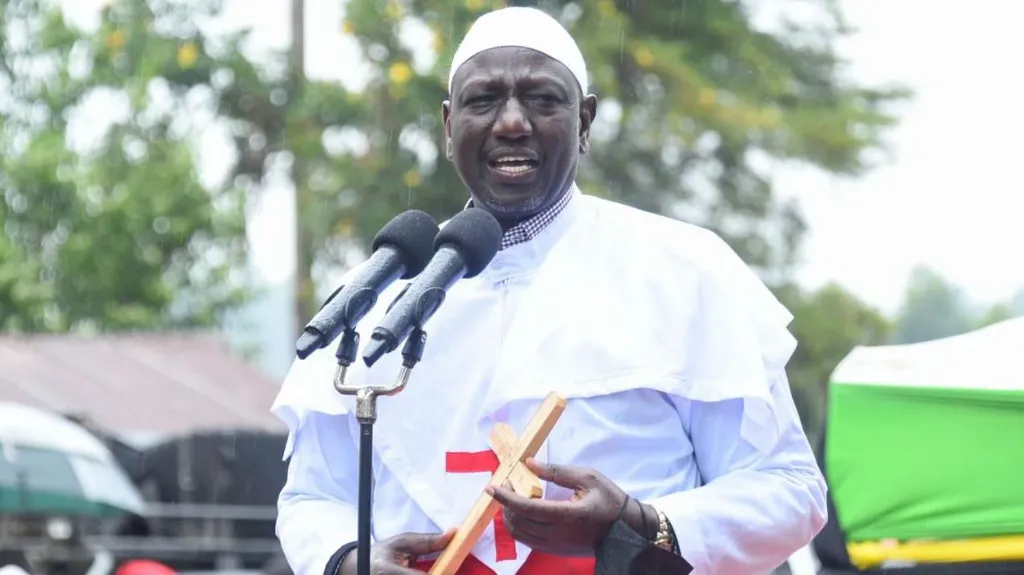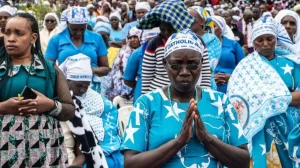How Kenya’s evangelical president has fallen out with churches
4 min read
William Ruto/X
Kenya’s evangelical president, William Ruto, has found himself at odds with the churches that played a crucial role in securing his election victory two years ago. Once lauded by many evangelical supporters as a “David” figure, symbolizing the biblical shepherd who rose to lead, Ruto is now facing significant backlash from church leaders across Kenya. This dramatic shift reflects his growing disconnection with the religious community, who once saw him as a political savior but now view him more like the corrupt biblical tax collector, Zacchaeus.
In the lead-up to his election, Ruto’s fervent Christian identity helped galvanize evangelical voters, and he became known for frequent church appearances across a variety of denominations. Whether attending Catholic masses or smaller, lesser-known sects, he often wore the appropriate religious attire and would sometimes display deep emotion, moved to tears by sermons. His devotion was clear, and he regularly credited God for his electoral success, even engaging in weekly church visits. However, over the past few months, the relationship between Ruto and the religious community has soured, largely due to his government’s controversial tax hikes.
The government’s new tax measures, which have raised salaries taxes, doubled the fuel sales tax, and introduced additional levies, have sparked widespread public outrage. These changes have prompted protesters, especially from the younger generation, to accuse the government of greed. Among the criticisms voiced during anti-tax protests was the charge that churches had become too cozy with politicians, allowing them to preach from the pulpit and curry favor with the state. This led to a public rebuke of Ruto’s administration, with church leaders increasingly voicing their discontent.
The shift in sentiment was evident when prominent figures like Teresia Wairimu, the founder of Faith Evangelistic Ministries, publicly criticized Ruto’s policies. She expressed embarrassment, lamenting the disconnect between the president’s actions and the promises made during his campaign. Similarly, Rev. Tony Kiama of the River of God Church condemned the government for failing to uphold “God’s purpose” and instead perpetuating corruption and rising costs of living.

The most critical remarks came from Kenya’s Catholic bishops, whose statements carry significant weight. They accused Ruto’s administration of fostering a “culture of lies,” citing unfulfilled campaign promises, increasing corruption, and stifling economic conditions due to over-taxation. The bishops also referenced the government’s violent crackdown on protests, noting the deaths, arrests, and disappearances that had followed anti-tax demonstrations. Their hard-hitting statement, which also rejected a generous donation from Ruto to a Catholic church, was seen as a clear rebuke of his leadership.
This development has echoes of the pivotal role church leaders played during Kenya’s struggle for multi-party democracy in the 1990s, when they challenged the authoritarian rule of then-President Daniel arap Moi. Back then, figures like Ndingi Mwana a’Nzeki and Timothy Njoya were fearless in confronting government policies. However, under subsequent administrations, church leaders appeared to lose their voice, and many feared they had been co-opted into the political system. Analysts now believe that Ruto’s administration has seen even greater interference from churches, with many of them becoming more reluctant to criticize the government, either for financial reasons or political pragmatism.
But the Catholic bishops’ stance has resonated with other religious groups and even Muslim leaders, who have expressed solidarity with their criticisms. Pentecostal leaders and evangelical figures have similarly praised the bishops for their courage, especially in rejecting Ruto’s financial gift, which they viewed as a political maneuver.
The growing tension between Ruto and the churches is complicated by his strong stand on social issues like abortion and gay rights, positions that earned him the support of conservative Christian and Muslim communities. However, the economic concerns sparked by his tax policies have overshadowed these earlier alliances.
In response to the mounting criticism, Ruto’s allies initially dismissed the bishops’ statements as “misinformation.” But political analysts caution that Ruto must tread carefully. With church leaders holding substantial influence over their congregations, a continued clash could harm his re-election prospects, particularly if key religious figures publicly turn against him. This was evident when his political strongholds began showing signs of rebellion, notably following the impeachment of his deputy, Rigathi Gachagua, over the handling of anti-tax protests.
In an attempt to calm tensions, Ruto has started to soften his stance. Recently, he acknowledged the critiques of the church leaders and expressed a willingness to engage further with them. In a tweet, he emphasized that while progress had been made, there was still much work to be done, and collaboration with religious leaders was necessary to fulfill the government’s commitments.
For Ruto, Kenya’s first evangelical Christian president, the lesson is clear: the very churches that helped elevate him to the presidency could play a significant role in bringing his political career to an end if their concerns are not addressed. As one analyst put it, “He knows he cannot fight the church.”







